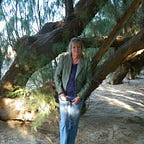How Life Would Flourish
Without Us. . .
“Before I was six years old, my grandparents and my mother had taught me that if all the green things that grow were taken from the earth, there could be no life. If all the four-legged creatures were taken from the earth, there could be no life. If all the winged creatures were taken from the earth, there could be no life. If all our relatives who crawl and swim and live within the earth were taken away, there could be no life. But if all the human beings were taken away, life on earth would flourish. That is how insignificant we are.” — Russell Means, Oglala Lakota Nation (1939–2012)
As a writer, I’ve followed a lot of quotes in developing plot and circumstance. More than once someone else’s single paragraph has pulled me toward a story I couldn’t resist. Even one sentence has had great impact. Dickinson’s “Hope is the thing with feathers,” comes to mind. That single phrase brought me to hundreds of hours of research and writing about a bird long gone from this earth. A quote’s impact changed my life. It is happening again.
As I wind down my small contribution to the Pandemic of 2019 National Women’s History Museum Journaling Project, it seems important to acknowledge that writing, though extremely insightful for others, and often written for others, doesn’t have to be for others. Journaling is a strong case for that belief. Much of what we write in private is literally meant to remain secretive and withheld from another reader. Journaling begs the question of “what” we are really writing for, because it totally excludes “who” we are writing for. The only conclusion I can come to is our inner belief that art, even inconspicuous art, has a place in this world. . . in other words, the art to myself is just as important as the art created with others in mind. I must remember Emily Dickinson herself, her life often sequestered and deeply committed to her words, didn’t see publication of over a thousand of her poems while she was alive. We cannot know the value of time, any of us. All we can do is follow our deepest commitment, in this case the commitment of journaling.
I will be honest. Writing about a pandemic and my reaction to it is not a favorite theme of mine. I started this project thinking I could create prolific notes. . . because I had already been through a writer’s version of a pandemic. I do have many research notes left among my Quick Fall of Light memorabilia, although many were burned intentionally many months ago. I’ve never believed my process would help anyone else. But a single sentence or single paragraph from someone who strongly influenced me certainly could. Because writing, deep writing, is a chain reaction. It is a spark ignited at just the right time in someone’s life, and in women, especially, that spark can be prolonged, detained, derailed and often watered-down in fitful attempts. Journaling keeps that spark confined to the immediacy of the moment, and sometimes that’s enough.
And so, at the winding-down of this pandemic, I move forward into another phase of it, the phase that might be called hidden, contrasting, and prophetic. Many agree that worldwide extreme illness is a symptom of a much bigger problem. And indeed, it is. Humans have interacted within nature, in spite of nature, in belligerence to nature, in elevation of nature, up down and all around since we figured out we could develop our own super-structure within the confines of a system known to be volatile and enigmatic. We can’t explain nature, but we think we can explain pandemics within nature. We’ve moved through this one as if we’re “getting a human handle” on virus. Perhaps, for the moment we are. But I always remember a science teacher of mine back in the 1970s asking if I was an existentialist. “Because I sometimes sense your dread in the actions of a disordered, chaotic human world,” she said. It took me a long time to figure out, and through writing I’ve moved into the realm of her observation. Though I was confused at the time, she was right to tell me. Humans are inventive and persuasive I came to believe. What they lack is humility.
Which brings me to Russell Means. This quote is the beginning of a new story for me, a story without us. A story of snow and wind and the long trail of scent and desire that animals must use every day just to survive. His words solidify my perspective of the world. . . literally a planet that doesn’t need us. And yet, a place where only mankind can mark his time here as enlightened enough to warn of truth. That much would change without us. That every single spring new life would still abound. That pandemics unleashed would alter other patterns, but not ours.
We have already had our turn, I think. And I’m not sure we’ve truly learned a thing.
